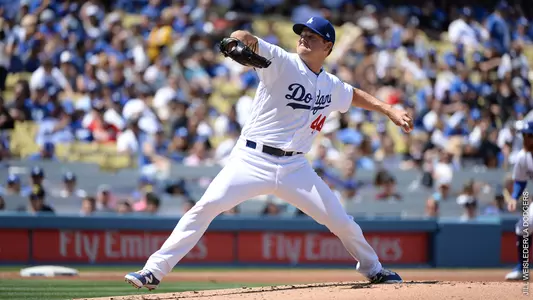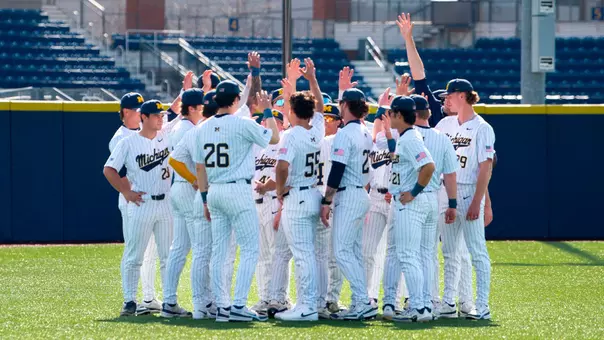
It's About Time: How Hill Became a Top Pitcher for MLB's Top Team
8/21/2017 10:36:00 AM | Baseball, Features
By Steve Kornacki
DETROIT, Mich. -- Rich Hill is one of the top pitchers for a Los Angeles Dodgers team that rests comfortably atop the highest peak in baseball.
And yet, just two short years ago, Hill had nearly fallen off the radar and was playing for the independent Atlantic League Long Island Ducks, making $2,000 per month and hoping to find a major league team who still believed in him as much as he believed in himself.
"I could realize with Long Island that this was going to be something," said Hill, who was drafted out of the University of Michigan in the fourth round in 2002 by the Chicago Cubs. "It doesn't matter where you are or where you're pitching -- whether it's the independent league or the big leagues or winter ball or rookie league ball, in front of nobody -- when you are out there, you can't be compromising.
"You have to get that first to understand the concept of time. I hate when you're younger and people say, 'You've got time. You've got time.' You don't have time. You need to act on it now if it's something you're passionate about. If you want to do it, take action. And that's the biggest thing people don't do. It's inaction. I tell the younger guys on this team: 'Now is the time.' "
He's a carpe diem kind of guy.
"We have today," continued Hill, 37, "and it's all that we have. Nothing is guaranteed for tomorrow, and so make the most of it. Taking that seize-the-day moment and using it as aggressiveness, using it as conviction, and taking that convicted attitude out there on the mound, even if the results aren't always what you want, you know the effort and conviction behind it. And I guarantee you that you'll be in that 'W' column rather than on that other side."
One year before pitching in the independent league, Hill and his wife, Caitlin, had to deal with something far worse than a career hanging by a thread. In February 2014, they lost their son, Brooks, only two months after his birth.
"We were fortunate to have our son, Brooks, for a couple months and enjoy that time that we had with him," said Hill. "So, we were extremely fortunate in that aspect. But also, that's how life is short and how you have to enjoy it as much as you can."
So when Hill signed a three-year contract for $48 million with the Dodgers in December and their oldest son, Brice, 5, leapt into his father's arms as the program ended, well, it was hard to put it all into words.
"I can't downplay that moment," Hill said. "It was extremely exciting, and I knew what was being built here and knew what direction we were going. It was all of the above on that day, and I was so thankful that my family could be there. I was extremely appreciative, especially with everything we've gone through as a family with my wife, Caitlin, and my son, Brice. They've both been amazing."
Hill beat the Detroit Tigers here Friday night (Aug. 18) at Comerica Park and is 9-4 with a 3.54 earned run average. Since Aug. 14, 2015, when the Boston Red Sox rescued him from the Ducks, only two pitchers in baseball have a lower opponent batting average than Hill's .197. They are Cy Young Award winners Clayton Kershaw (.192), who dressed next to him in the Comerica clubhouse, and Max Scherzer (.195).
So, how did Hill go from the scrap heap to the top of the heap?
Well, while with the Red Sox in 2015, assistant pitching coach and vice president of pitching development Brian Bannister convinced Hill to throw more curveballs by offering a study of analytics that said it would lead to "more success" for him. That approach figured significantly in reestablishing Hill as a proficient major league pitcher late that season.
With a fastball that, according to PitchFX, averages only 89 mph this season, Hill still slices and dices hitters to bits, and he also has a sidearm version of the curve that keeps opponents even more off balance. He uses command, precision and knowledge to win battles.
The Oakland A's signed Hill as a free agent for 2016, and the Dodgers acquired him for the final two months of that season to bolster their starting rotation. They were impressed by his 9-3 record and 2.25 ERA with Oakland, and he didn't disappoint them.
Hill was at his best in Game 3 of the National League Championship Series, when he shut out the Chicago Cubs for six innings, limited them to two hits, and picked up the win.
"It was kind of a big point of all these opportunities that have come together," said Hill. "If anybody can take anything from this, it's really just living in the moment. You have to be 100 percent in the moment, right down to focusing on every single pitch.
"Location is important, but conviction trumps location for me. Hitters can see when you're convicted and you're coming right at them."

The Dodgers knew they had a keeper.
"So much of our confidence (in Hill) comes from knowing him," Dodgers general manager Andrew Friedman told The Washington Post. "There aren't 10 guys that I've been around in my career that ranked as highly as Rich does in terms of having that truly innate, burning desire to win."
I asked Hill, who has a calm demeanor and doesn't wear his fire on his sleeves, about the source of that "burning desire".
"You know," said Hill, "every time you get an opportunity to pitch you don't want to compromise the effort. My effort is always going to be 100-plus percent. So, a big part of that 'desire' comes from realizing we don't have a lot of time to play with."
He sure came to the right place for winning. The Dodgers are 87-35 and on pace to win 116 games to tie the record for the most victories in one season.
"A lot of this stuff that's going on -- especially here -- you've got to enjoy it," said Hill, who has played for seven teams in 13 seasons with a 47-32 pitching record. "You might not see this again.
"For me, you bounce around and play in so many places, you appreciate what you are seeing because you never know when it's going to come around."
Dodgers manager Dave Roberts told me that he highly values Hill not only for his mound prowess but for his mind power and friendship.
"I think the thing that most impresses me about Rich is the path that he has taken and the things that he's overcome," said Roberts. "And to still be one of the top pitchers on a championship team at the age of 37. You know, every player evolves in their own way, has a learning curve and way of transforming.
"And Rich at this point is very mature in how he approaches his job. He lives for the moment and is very stubborn in that belief. So, the way he prepares and focuses from pitch to pitch, and understanding where he's come from, but also having that really narrow scope.
"But he's such an enjoyable guy to be around. He has a lot of knowledge and experience. But with that, trying to learn each day, and he's a student of the game. And for me, it's a pleasure to get to know him each day."
I asked Hill about the "stubbornness" Roberts described.
"Sometimes it's just difficult for me to compromise in situations -- whether it's coming out of games or throwing certain pitches," Hill said with a slow smile. "If I believe what I want to throw is the right pitch, then I'm going to throw that pitch. It's going to be tough to convince me otherwise. That's the stubbornness."
Hill said he learned about taking the right approach at Michigan.
"We had a hitting coach, Chris Harrison, who was extremely influential (and also was interim head coach for one season)," said Hill. "The way he went about his business was very calm, very controlled, and he treated everyone the same, with the same respect. He didn't try to change anybody. It was like a locker room at the major league level, letting everyone be themselves. When everybody can be themselves everything flourishes.
"Also the (current) Colorado Rockies pitching coach, Steve Foster, was great to talk to. He also wanted guys to be comfortable and learn on their own but injected his points when he needed to. Those two guys, along with (assistant coach) Matt Hyde, who recruited me to Michigan, who I'm still extremely close with, were very influential."
Hill, now 6-foot-5 and 220 pounds, was only 7-16 with a 4.92 ERA in three seasons for the Wolverines. But he also struck out 229 in 177 1/3 innings, and that got the attention of pro scouts.
"I think a lot of it was getting stronger and getting used to my body," said Hill. "I was so long and lanky coming in, and getting strong helped me in my pro career.
"What I wished I'd done more at Michigan was that conviction-aggressive part. I love pitching, and that should be one of the first key points taught to young pitchers. That and the breaking ball. I've always been able to spin the ball."
It all took time for Hill, who knows all too well just how valuable that is.










